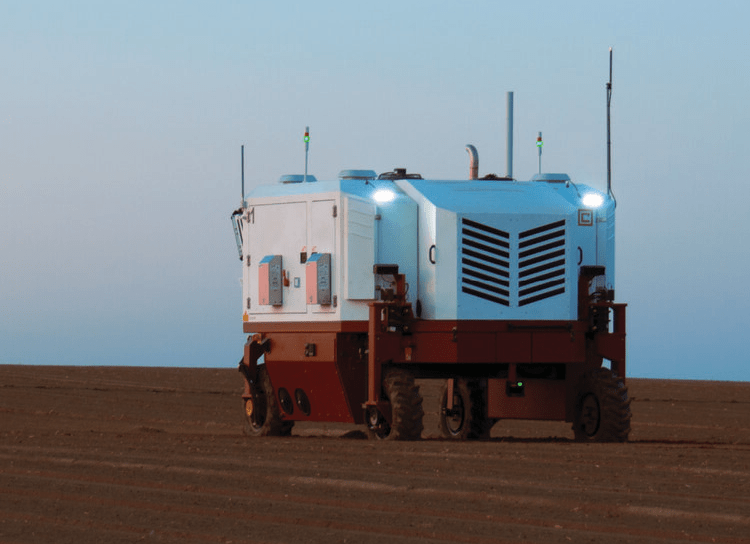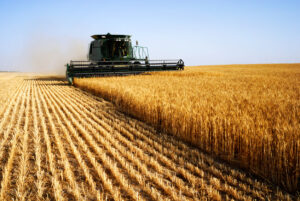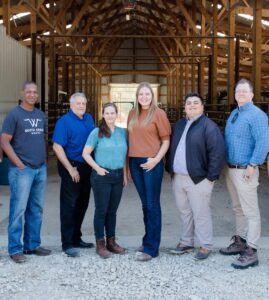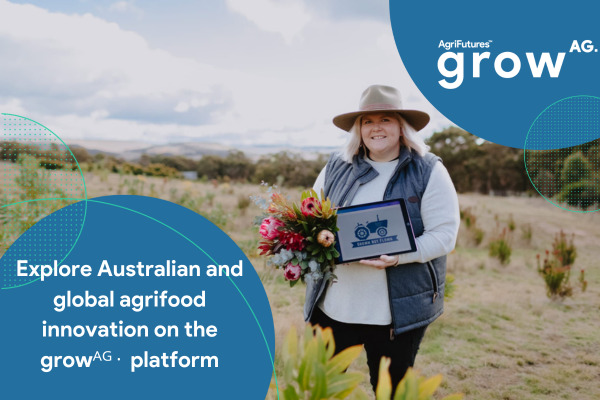Autonomous robotics company Carbon Robotics today debuted its third-generation weeding robot which combines AI and laser technology to take care of one of farmers’ least-favorite jobs.
“After meeting with a bunch of farmers and talking about their costs and biggest struggles with automation, weed control really kept popping up,” the startup’s founder and CEO Paul Mikesell tells AFN.
“So, we built an autonomous robot that drives itself and uses computer vision to kill weeds with a really high-powered laser.”
A single robot can weed up to 16 acres per day, replacing several hand-weeding crews, according to the Seattle-based startup. Each one weighs about 10,000 pounds and is the size of a medium tractor, using a hydraulic diesel system for power.
The bots are armed with eight 150-watt carbon dioxide lasers that are capable of cutting metal. They rely on computer vision tech to identify weeds and distinguish them from the valuable crops farmers are aiming to protect.
“We use a similar technology to what Facebook might use to show you that the person in your photograph is your cousin, or that self-driving cars use to locate pedestrians or lanes on the highway [and] repurposed it for weeding,” Mikesell says, adding that he believes Carbon Robotics has been at the forefront of advancements in computer vision “in the last five to eight years.”
One of the peskiest hurdles Carbon Robotics had to overcome was lighting. The computer vision tech it uses depends on stable lighting conditions, which are hard to lock down on a farm throughout a 24-hour period.
“We’ve had to develop a really powerful lighting system that synchronizes with our cameras to give us the image quality that allows us to have this kind of accuracy to run day and night,” Mikesell explains.
Carbon Robotics believes the biggest benefit of its laser-led approach is leaving the soil and its microbiology completely undisturbed. As soil health continues to be a major topic in the agriculture industry, opportunities to address it through innovation are a hot commodity.
Being able to forgo the application of herbicides makes the device a prime candidate for farms wanting to adopt regenerative practices – as well as the organic farming market, where producers are limited on the types of inputs they can use to tackle weeds.
Other purported benefits of Carbon’s robots are lower overall costs because of reduced dependence on manual labor, fewer inputs, and improved yields due to less weed pressure.
Since its founding in 2018, Carbon Robotics has worked with farmers to hone its technology and make it directly applicable to the practicalities of their operations. This involved beta tests on specialty crop farms, and working on farms with a variety of crops including broccoli and onions.
“This is one of the most innovative and valuable technologies that I’ve seen as a farmer,” said James Johnson of Carzalia Farm, a Carbon customer, in a press release.
“I expect the robots to go mainstream because of how effectively they address some of farming’s most critical issues, including the overuse of chemicals, process efficiency, and labor. These robots work with a variety of crops, are autonomous and organic. The sky’s the limit.”
Carbon Robotics is selling its new model directly to farmers, mostly on the US West Coast so far. It’s already sold out for 2021, but new models for the 2022 growing season are available for pre-order. The startup also offers a leasing option, which often makes more sense for farms with smaller acreages.
“We do have a way to go on the software side. We’d like to be able to give farmers more access to data and real-time information about what’s happening beyond just shooting weeds,” Mikesell says.
“The future is really about scaling the manufacturing and continuing on the software innovation. I’m really excited about all the innovation that’s happening on farms and I hope we can see more investment in this direction.”
California’s Bear Flag Robotics, which “up-fits” tractors to make them autonomous, raised $7.9 million earlier this year, while Paris-based Augmenta secured $8 million last month for its own retrofitted solution.
Last week, Denver’s Tortuga AgTech announced a $20 million investment into its harvesting robot technology.















Sponsored
Sponsored post: The innovator’s dilemma: why agbioscience innovation must focus on the farmer first